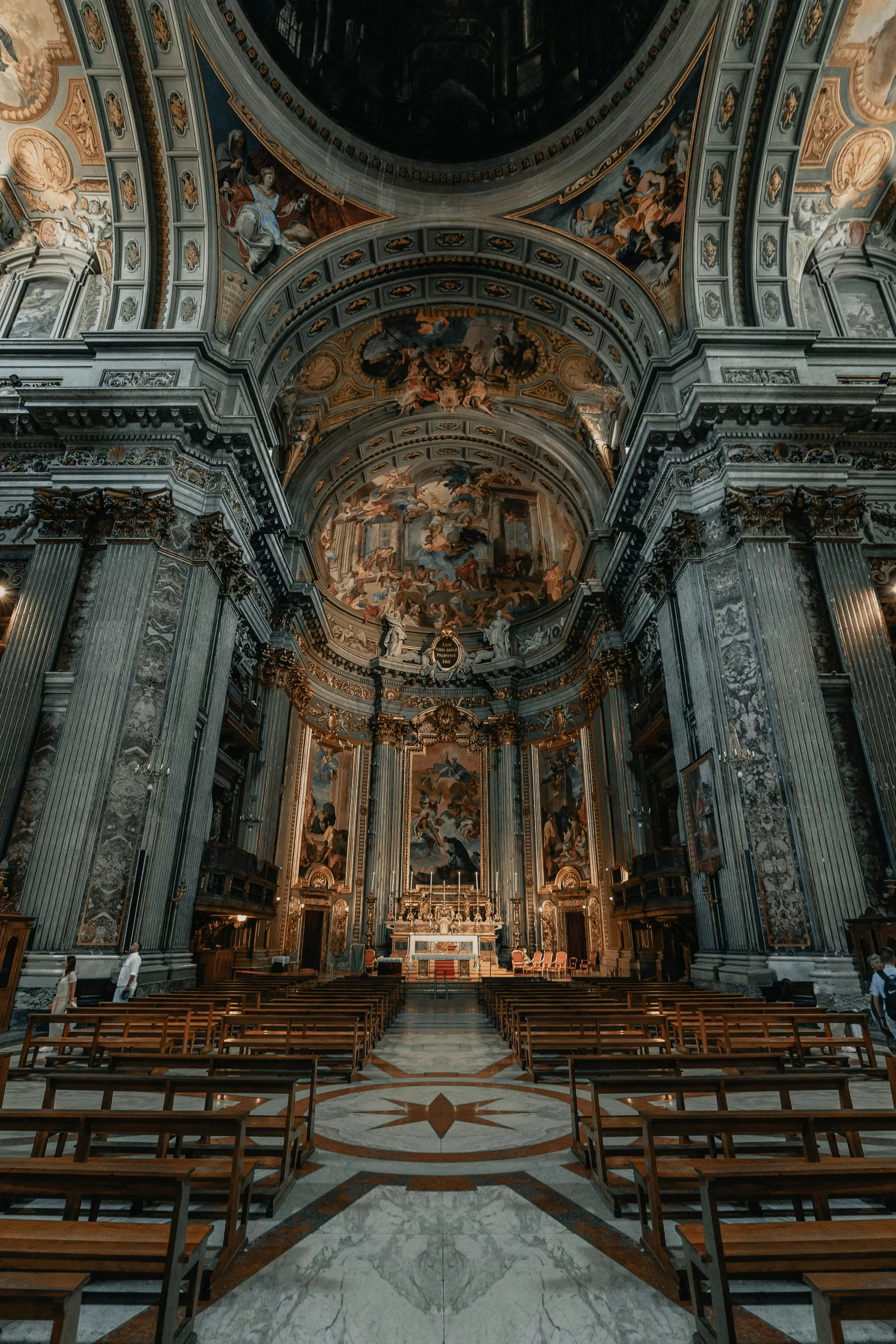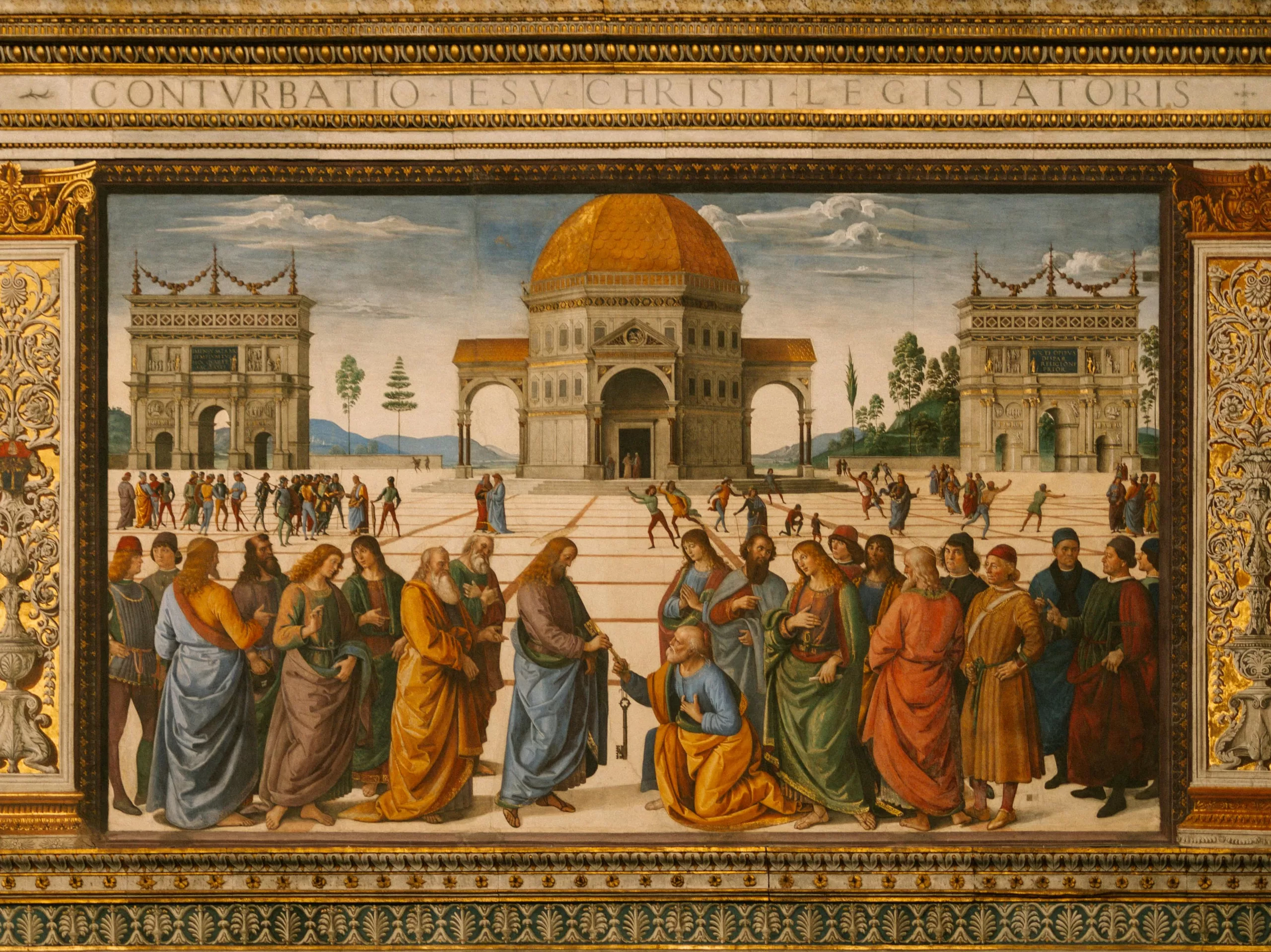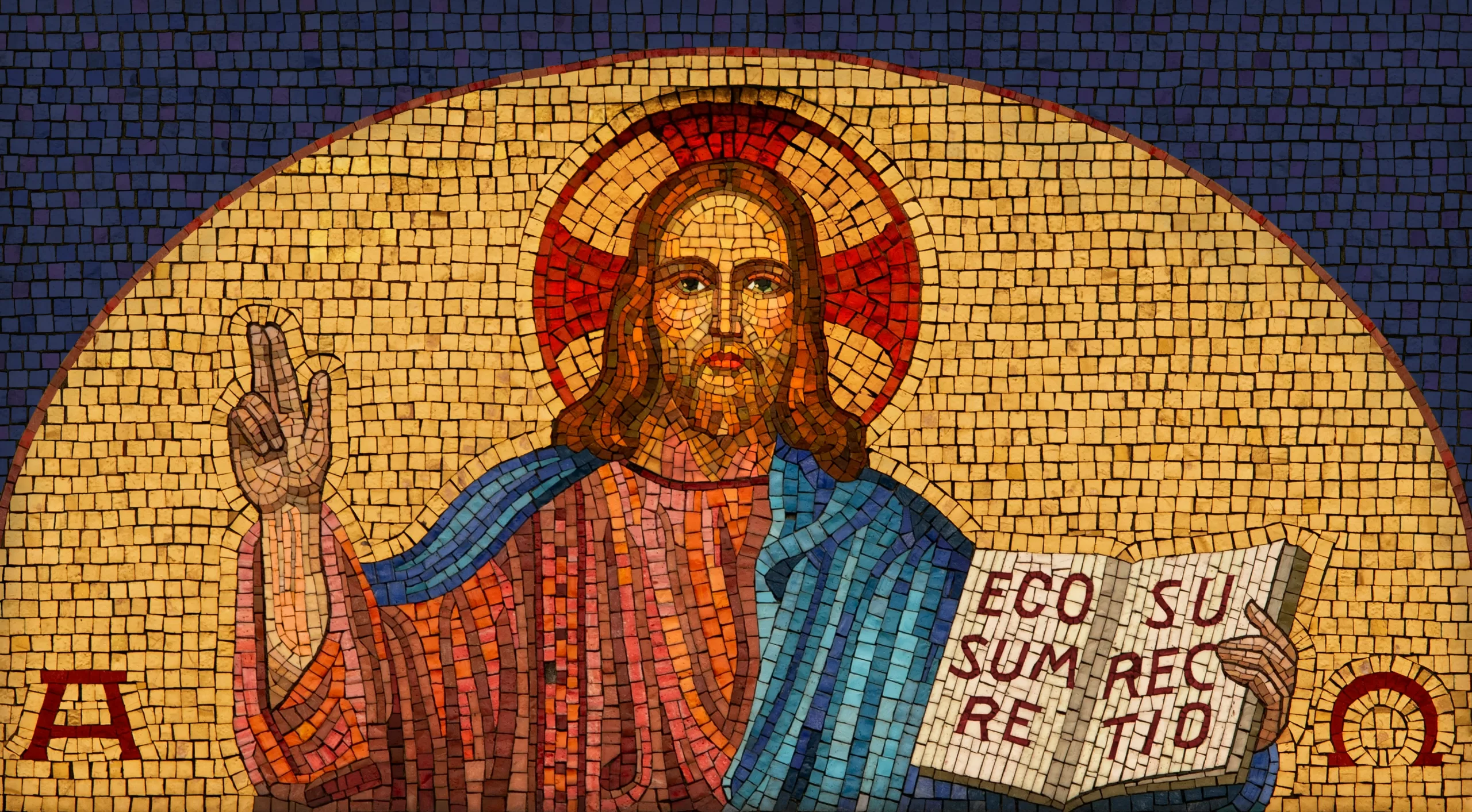In the 19th chapter of his Gospel, the Evangelist John writes: “ Pilate also wrote an inscription and put it on the cross it read, ‘Jesus of Nazareth, the King of the Jews.” Many of the Jews read this inscription, for the place where Jesus was crucified was near the city, and it was written in Aramaic, in Latin, and in Greek. So the chief priests of the Jews said to Pilate, Do not write, ‘The King of the Jews.’ But rather, This man said, I am King of the Jews,’” Pilate answered what I have written I have written.” (John 19:19-22). Pontius Pilate inscribes Jesus as king of the Jews in three languages: Aramaic/Hebrew, Latin, and Greek. In these three dominant languages, Christ is mockingly proclaimed the long-lost king of Israel, descending from King David and the line of Judah. Ultimately, the Messiah and the savior of man. It is fascinating to think that the man who sentenced Christ to death is the first to proclaim the true identity of Christ to all the nations of the World. A strange paradox that man represented in Pilate knew precisely who he had just killed, the Messiah, God Himself, and wished to reveal it to the whole world. The languages chosen indicate the covenant is now open to all people and no longer relegated to the people of Israel.
Why these three languages? In historical context, these were the three languages of the time and place. As they were in Palestine, the people spoke Aramaic and Hebrew but were ruled by the Romans, who spoke Latin. The wider-reaching language of the time was Greek. Pilate wanted to make it clear to all who Jesus was. These three cultures have had a profound impact on the world and continue to permeate all areas of life.
The Hebrews
No document or book has influenced history as much as the Bible. The majority of the content of the Bible is the Old Testament, which is entirely written by the Hebrews. The Bible itself is the great story of God leading and saving His people, the Israelite’s. This story culminates in God Himself entering into the story by becoming man and saving them from within. The influence of the Hebrews has penetrated all aspects of life. What is so unique about their influence is that it comes not from a powerful kingdom, scientific discoveries, war/conquest, or any earthly cultural influence, but instead, it comes from stories of their people and their interactions with God. Three stories we will focus on are the creation of man, God revealing himself in the story of Moses, and the story of King David.
Genesis chapters 1-3 are some of the most beautiful and powerful things ever written. The importance of these three chapters can not be stressed enough, they are the bedrock and foundation of about everything we hold dear today. We see the world was created out of nothing and by God who creates out of peace and love. All things are placed in an orderly manner, and the world itself is made for man. We find out man is the crescendo of creation and made in the “image and likeness of God.” Likely the most influential verse in the Bible. This teaches us that man is made good and made to share in the life of God Himself. We then see the personal touch God uses to create man out of the clay and breathe life into him, “Ruah”(Genesis 2:7). This shows the intentionality of our creation and the intimacy God desired to have with man. God continues to bless man with the gift of woman, with whom Adam may now share all of creation and his very self. Since God’s plan was for man to share in His own blessed life, the gift of free will was imbued so man may choose God and be able to love. This gift is put to the test as the drama unfolds. An unexplained character arrives, espousing the way to hidden knowledge and true freedom that exists just beyond the commands of God. Our first parents fall prey to this seduction, doubt the goodness of God, and rebel by eating the tree they were forbidden to eat. The drama unravels into a tragedy in which they are now subject to the coercion of sin and the slavery of death. The goodness they were created with is not erased, but they are now sick with the disease of original sin, which breaks their harmony and leads to death.
This story shapes the way humanity and cultures have understood God and viewed themselves throughout history. We take the axiom that God is all-powerful, all-good, all-present, all-knowing, and desires a relationship with man. We conclude that man was made good for perfection but lost the fullness of it. He retains goodness but now is broken and in need of a savior.
The stories continue to center themselves around God as he reveals Himself to man. He calls out to His people in their slavery and sin and longs to lead them to the promised land where they can worship Him alone and live in prosperity. He chooses an unqualified man in Moses to lead His people out of the slavery of the Egyptians first by revealing Himself in the burning bush. “And the angel of the Lord appeared to him in a flame of fire out of the midst of a bush. “He looked, and behold, the bush was burning yet it was not consumed” “Then God said to Moses “I AM WHO I Am.” And he said to Moses “say this to the people of Israel: ‘I Am has sent me to you.” (Exodus 3:2,14). The bush that was burning and yet unconsumed is a truth about who God is. He sets ablaze, and yet nothing is lost in its original form. God reveals His name to be I AM. A deeply terrifying and beautiful reality. Inconceivable and yet makes perfect sense. God does not say I am a higher being but that I AM Being. With this, Moses accepts his call and begins to lead the Israelites through many trials out of Egypt, while God is fighting for His people. The same doubt of God that Adam and Eve had is seen all through the story and is always the cause of their downfall. This doubt led them to wander in the desert for 40 years. To wander in a place of death without a home, paralleling man’s lot after the fall.
A pivotal moment in the Israel story is when a man named David comes on the scene. Anointed king by the prophet Samuel as the youngest and least likely to be named king of all his brothers. “But the Lord said to Samuel, ‘Do not look on his appearance or on the height of his stature, because I have rejected him. For the Lord sees not as man sees: man looks on the outward appearance, but the Lord looks on the heart.”(1 Samuel 16,12) We see what David’s heart is made of in his decision to fight Goliath. All the warriors of Israel are too scared to take up Goliath’s offer for a one-on-one battle. David, as a shepherd boy, trusts in the Lord and runs to meet Goliath with full faith that the Lord will use him to slay the opponents of the Israelites. We see God using the weak to shame the strong, teaching humility and full faith in Him. We see an instance of faith in the Lord instead of doubt. A foreshadowing of the messiah who will usher this faith into the world as the antidote for our sickness of sin. David later assumes the throne and leads the people of Israel into Jerusalem and establishes the kingdom there. David is quoted as a man after God’s own heart. We see this in his faith and love for the Lord, but we also see that Sin is still alive and David can not conquer it. David’s fall is tragic and horrifying. It starts with laziness and takes him down the path of lust, adultery, murder, and a cover-up. Truly a fall from grace and an ever-resounding sign of Israel’s need for the messiah to save them from Sin and Death.
The Greeks
Greek (Hellenistic) culture is inescapable in today’s world. Almost all Western languages are littered with Greek words, prefixes, expressions, and ideas. Greek culture is vast, but three points to focus on are the philosophers, poets, and scientists of their time, whom we still engage with daily.
Many consider Plato to be the dawn of philosophy. With his dialogues, he shaped the way man engaged with the world and came to make sense of reality. The character of Socrates in his dialogues goes around asking people questions until others’ ideas and arguments fall flat on their faces. He declares no great knowledge except one piece of wisdom, which sets him apart from the rest. Socrates says he is the wisest because he knows that he knows nothing. This bit of wisdom takes Plato to the highest of his philosophies of forms and essences. That there is something or someone beyond man’s mind. A mind, a rationality that rules and governs reality. Not simply a higher being or higher essence than man, but being itself as essence. A Logos, as Plato calls it.
Of all the great poets throughout history, few have as good a claim on the throne as Homer. Homer wrote the Iliad and the Odyssey. These are epic poems that depict the tales of the Greeks and their mythology of the world and how they came to be. From the stories of Achilles to Odysseus to Hera to Aphrodite, they traverse through man’s knowledge of the world and showcase who man is. Gk Chesterton once said, “The Iliad might well be the last word as well as the first word spoken by man about his mortal lot, as seen by merely mortal vision. If the world becomes pagan and perishes, the last man left alive would do well to quote the Iliad and die.” This is a profound quote. Two main ideas to take away are that Homer in the Iliad has represented man’s lot as well as a human could apart from Divine revelation. Second is that the “Iliad being the first word of man” ought to also be his last if we abandon Christ. No man apart from God will ever describe or portray humanity any better than Homer did, and if the hope of salvation and redemption ever vanishes, we might as well quote Homer and die.
As the Greeks tried to make sense of the world through metaphysics, they also did so through the physical sciences. Greek culture started rolling the great ball of science and has entrusted it to us, their discoveries are much of the bedrock of our current innovations. Names such as Aristotle(Father of Biology), Archimedes(Father of Mathematics), and Hippocrates. (Father of Medicine) I have left off countless names, such as Pythagoras, which we can all remember from learning his theorem. Their efforts have been much of what has propelled our own culture to embrace and hold science and math in such high regard. No matter what area of STEM one goes into, the Greek influence will be inescapable.
The Romans
The Roman Empire is the longest and most influential empire in world history. The legends of Rome start in 753 BC with Romulus and Remus and the founding of Rome. Caesar Augustus, the adopted son of Julius Caesar, was proclaimed emperor by the Roman Senate in 27 BC, ushering in the era of the Roman Empire. The empire officially ended with the fall of Constantinople to the Turks in 1453.
Rome’s power must not be underestimated in its continual influence today. Aside from having conquered much of Europe, at its peak, it reached from modern-day England to modern-day Iraq. We will focus on politics, Latin, and architecture.
Before the empire, Rome was organized as a republic. Citizens elect representatives to convey their interests and vote on how to govern society. This system is known as the Roman Republic, featuring the Roman Senate. Both terms and concepts are still in use today in the United States and many Western nations. Most Western nations are not true democracies but rather republics where leaders are elected to vote on behalf of the citizens. This structure often mitigates the risk of mob rule in a democracy, where 51% hold power over 49%. These principles are fundamental to Western civilization and have fostered peaceful and free societies.
Along with forms of governance, Rome instituted many laws and courts to oversee these laws and provide justice. A practice we still uphold in the modern world. The most famous of these trials would be Jesus before Pilate. In the legal world, Latin is the second language, and many of our legal terms and ideas are derived directly from Rome.
Roman architecture continues to amaze as the Coliseum and the Pantheon attract millions of visitors each year. Most churches are rooted in or stem from a Roman style of building. Romans popularized the use of concrete and created ordered cities with aqueducts to bring water into the city. All roads lead to Rome is a popular statement used today, encapsulating the power of the Roman roads. The wide-reaching grip of the Roman Empire required easy access for Romans to travel, especially for the empire to keep order and rule. These roads were used by the early Christians to spread the Gospel and made travel from long distances much more feasible. All of Rome’s archetypal achievements are still readily used and built the framework for much of European culture and, ultimately, America.
Latin is the father of all languages because the Romans spoke it. One way to tell how dominant a culture is is by measuring how many people speak the language. Now, many say the language of Latin is dead, but I would say in the same way a seed dies to bear fruit, so has Latin died to give life to the Romance languages. The Romance languages named after Rome are the languages Italian, French, Spanish, Portuguese, and Romanian. These five added languages have approximately 1.2 billion speakers around the world, which would make them more spoken than any other language in the world. Around half of the English languages come from Latin words, and much of the German language as well. This makes Latin the Father language and the common language in Europe. The Official language of the Catholic Church is Latin, and it is the language that united all of Christendom and continues to unite all followers of Christ today.
What Pontius Pilate inscribed was true, and Christ’s divinity and Lordship spread to all the nations, starting with the Jews and moving to all corners of the earth. Out of this acknowledgment of Jesus as Lord and Savior, the culture of Christianity sprang up Christendom. The odd and beautiful thing about Christianity is it doesn’t destroy all cultures that came before it but instead consumes and absorbs truth and elevates all things to be subjected to the highest good, namely God. Jesus fulfills Judaism by being the long-awaited Messiah. Elevates Greek thought by being the ultimate good God Himself The Logos made flesh. Conquers and redeems Rome by making it the center of His Church, using its power to spread the good news and ultimately changing its name to the Holy Roman Empire. These three cultures give rise to the most beautiful culture of all, the culture of truth and love, the culture of life, and the culture of God. The bedrock and incorporation of these three cultures set the stage for man to welcome Christ as his savior and Lord.
Jesus says “and you will know the truth and the truth will set you free.” (John 8:32). St. Paul states, “If I speak in the tongues of men and of angels, but have not love, I am a noisy gong or a clanging cymbal. And if I have prophetic power, and understand all mysteries and all knowledge, and if I have all faith, so as to remove mountains, but have not love, I am nothing. If I give all I have and if I deliver up my body to be burned, but have not love I gain nothing. (Corinthians 13:1-3) Truth and love are the two tenets spoken of. One can not be free without knowing the Truth, as Christ states, and Christ states clearly He is the “Truth”(John 14:6). St. Paul alludes to all things being worthless without love. Even with all knowledge and perfect eloquence, without love, he is but a banging drum. We know Jesus is the Truth, and we also know St John proclaims “God is love”(1 John 4:8). The two put together teach who God is and who we are called to be. Our Name Veritas vav Agape means truth and love in Latin, Hebrew, and Greek. We feel drawn to encounter and proclaim God through truth and love. Our name honors the cultures inscribed on the Cross of our salvation, proclaiming the identity of Christ. We hope to continue this great tradition of encountering Jesus in all areas of life and proclaiming his identity as King of the Jews, Son of God, Redeemer of the world, and Lord to all.



